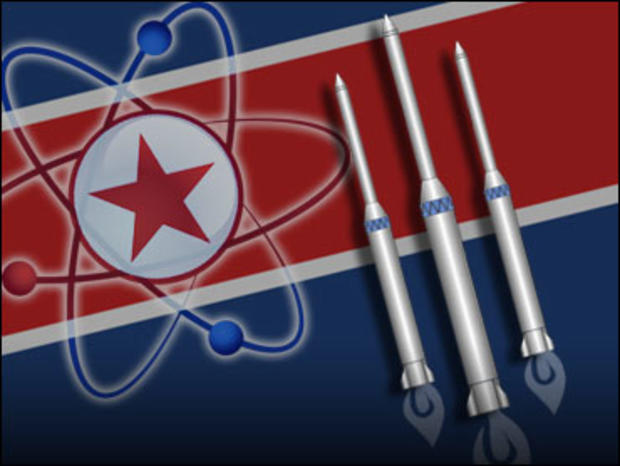N. Korean missiles could hit Guam, Japan warns
North Korea is developing a new mid-range ballistic missile that could reach as far as the U.S. territory of Guam, according to report released by Japan's Defense Ministry.
The annual report, widely known as the 2011 White Paper, also highlights North Korea's atomic bomb testing as "a significant threat to Japan's security when the North is boosting capabilities of ballistic missiles that could carry weapons of mass destruction."
The report, released Tuesday, does not bode well for progress in the talks between the U.S. and North Korea.
Japan also is concerned about China's growing naval reach in the Pacific and what it called Beijing's "opaque" military budget.
"Considering the recent modernization of China's maritime and air forces, the areas affected by the capabilities will likely expand beyond its nearby waters," the report said.
Japan's report comes at the same time that North Korea begins as president of the United Nations Conference on Disarmament. The new president, North Korean Ambassador So Se Pyong, appointed in July, told the diplomats in Geneva, that he was "very much committed to the Conference." Canada is the first nation to protest the appointment.
Meanwhile, the official and subsequent "unofficial" talks between the U.S. and North Korea did not produce tangible results, but all sides appeared to be happy that they were talking.
U.S., North Korea hold rare talks
"We are probably as far apart on some of the fundamental issues as we've ever been," said Evans J.R. Revere, senior director of Albright Stonebridge Group, (whose principals include former Secretary of State Madeleine K. Albright) after discussions with North Korean officials, which followed two days of official talks between the Obama administration and Pyongyang. Revere, who was acting assistant secretary of state for East Asian and Pacific Affairs during the George W. Bush administration said the "take-way" was that "there is a value of continuing contact and dialogue if, for no other reason, than to understand the thinking on the other side."
The official meetings, between North Korean Vice Foreign Minister Kim Kye Gwan and U.S. Ambassador Stephen Bosworth, the Obama administration envoy on North Korean affairs, which took place last week, were described by the State Department as "constructive."
The idea of having non-government representatives from two countries meet has been called Track II, and in this case it was former U.S. government officials meeting with current officials of North Korea. Stephen J. Del Rosso, Jr., program director of International Peace & Security at the International Program of the Carnegie Corporation of New York, said that they have been the major sponsor of Track II diplomacy on North Korea over the past decade, to do what governments can't or won't, "that is to provide a forum for a candid, frank exchange of views."
Why now?
"I don't think most people realize how close we came to military conflict on the Korean Peninsula last year," said Professor Donald Zagoria, who served during the Carter administration as a consultant to the National Security Council and the Bureau of East Asian and Pacific Affairs of the State Department. Emphasizing that it was his view "not those of the negotiators." he said that "both sides have come to the conclusion that after two years of non-contact, this has become more dangerous, more unsatisfactory, on a number of grounds, for both sides"
"On the North Korean side," Zagoria said, "this is just my speculation, I don't have any inside information, I think they are uncomfortable with becoming globally dependent on China; They have very great economic difficulties at home, including food problems; I think they are undergoing a succession problem that is very sensitive, and nobody knows what might be the outcome."
He added that his impression was that the Chinese played a constructive role in telling them, warning them against any provocation, "So, in a sense, they have a lot of challenges on their side and opening up to the United States under these circumstances makes some sense."
"On our side," Zagoria said, "after two years of non-contact, we still have an unrestrained North Korean nuclear and missile program. That's not good."
Pyongyang's official news agency, Korean Central News Agency (KCNA), reported after the official talks that North Korea wishes to "resume the six-party talks without preconditions at an early date" and "comprehensively implement a 2005 denuclearization deal."
U.S. negotiator Stephen Bosworth was more cautious, as was Mark Toner, Obama's State Department deputy spokesman on Monday. Toner said, "in terms of next steps, we're looking at consulting with our other six-party partners."
"We thought that ... these were good meetings, that they were constructive, and we're going to consult with our partners on the way forward," he added.
"But it's important to remember that this is the first meeting we've had with North Korea in 18 [or] 19 months. We've said from the very start that these were exploratory, and we went in with our eyes wide open in what to expect out of them. So did we expect any major earth shattering breakthroughs? Not really, but we did find them constructive, and we're going to consult on next steps."
In response to North Korean negotiator Kim Kye Gwan's statement that their uranium enrichment program is for peaceful purposes, to produce electricity, Toner said, "Then they need to live up to their international obligations and transparently show the world what their nuclear program is."


